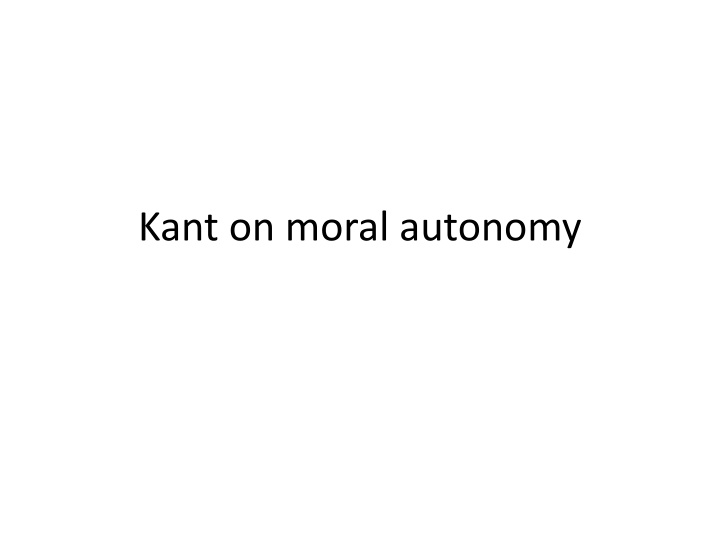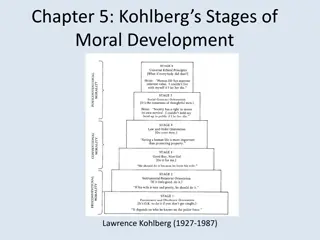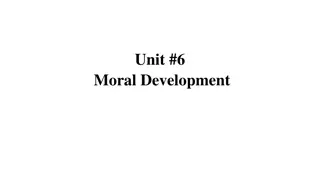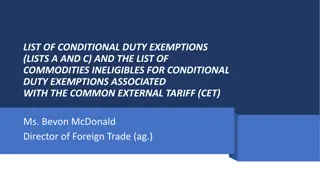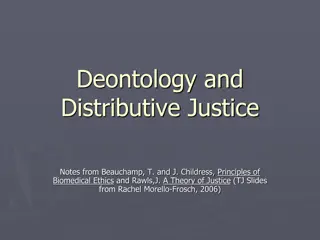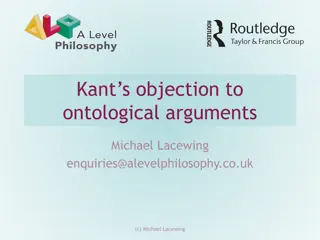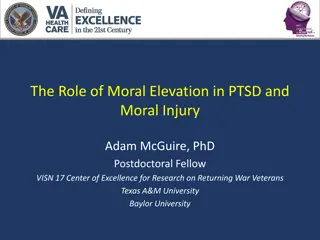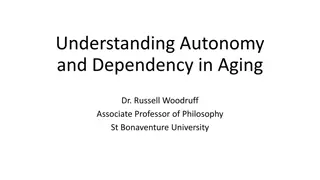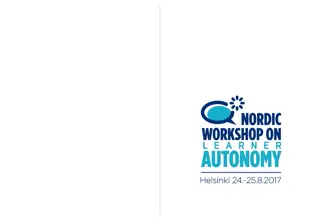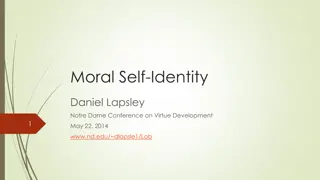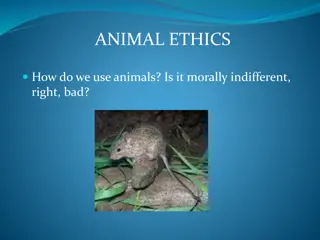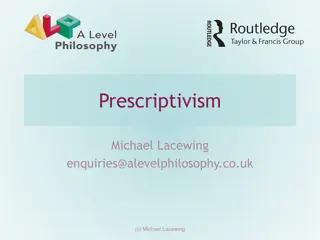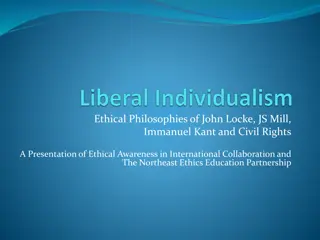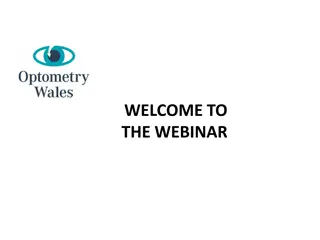Kant on Moral Autonomy: Insights on Duty and Inclination
Immanuel Kant emphasizes the significance of moral freedom and autonomy, highlighting the superiority of acting out of duty over mere inclination. He asserts that a good will is inherently valuable, irrespective of consequences or external motivations. Kant distinguishes between actions driven by duty, inclination, or other motives, suggesting that true moral worth lies in acting solely from duty. This exploration delves into Kant's perspective on morality, duty, and the intrinsic worth of ethical actions.
Uploaded on Sep 15, 2024 | 2 Views
Download Presentation

Please find below an Image/Link to download the presentation.
The content on the website is provided AS IS for your information and personal use only. It may not be sold, licensed, or shared on other websites without obtaining consent from the author.If you encounter any issues during the download, it is possible that the publisher has removed the file from their server.
You are allowed to download the files provided on this website for personal or commercial use, subject to the condition that they are used lawfully. All files are the property of their respective owners.
The content on the website is provided AS IS for your information and personal use only. It may not be sold, licensed, or shared on other websites without obtaining consent from the author.
E N D
Presentation Transcript
1. Kant and Rousseau [M]oral freedom alone makes man truly the master of himself; for the impulsion of mere appetite is slavery, and obedience to the law one has prescribed to oneself is freedom. (SC, 54) I myself am a researcher by inclination. I feel the entire thirst for cognition and the eager restlessness to proceed further in it, as well as the satisfaction at every acquisition. There was a time when I believed this alone could constitute the honor of humankind, and I despised the rabble who knows nothing. Rousseau has set me right. This binding prejudice vanishes, I learn to honor human beings, and I would feel by far less useful than the common laborer if I did not believe that this consideration could impart a value to all others in order to establish the rights of humanity. (Immanuel Kant, Observations on the Feeling of the Beautiful and Sublime, 1764)
2. Morality and reason A good will is absolutely or unconditionally good Some things (e.g. intelligence, courage) are good in certain respects but bad in others (think of a criminal who is both intelligent and courageous) A good will is not good simply in relation to some end (instrumental value), or good only under certain conditions (contingently good) A good will is good irrespective of its consequences and any contingent conditions
The word ought implies an obligation and hence the notion of duty if you have a duty to do something, you are obliged to do it A person s will can, however, be subject to forces (e.g. desires, inclinations, fears) that prevent him or her from doing what he or she recognizes to be the morally right thing to do Question of motivation For Kant, doing one s duty requires acting from duty alone Acting from duty v. acting in conformity with duty
Outwardly moral actions can be determined by: (1) Higher order motives one acts in conformity with morality so to realize some other end e.g. a shopkeeper is honest because this makes good business sense having a thriving business is the real purpose of acting morally (2) Immediate inclination e.g. a person simply enjoys helping others, that is, he or she is naturally disposed to help others (3) The motive of duty alone Only actions whose motive is 3 are truly moral (1) and (2) are based on desires that agents happen to have
Is Kant saying (a) an action has no moral value at all if it is in any way in accordance with one s inclinations? OR (b) an action motivated by inclination has no moral worth unless it is also motivated by a concern for duty? If (b) he can be taken to mean: Although one has an inclination to act morally, even without this inclination one would have acted morally The inclination is morally irrelevant Actual consequences of acting morally are also morally irrelevant
3. The lawfulness of moral agency Rational agents act in accordance with the representations of laws/rules Two types of rule expressed in the form of a command: (1) Hypothetical imperatives instrumental I ought to do x in order to achieve y (e.g. I ought to revise if I want to pass the exam). If x, then y Contingent: if I renounce the end I also renounce the means (2) Categorical imperatives unconditionally valid - I ought to do x simply because I ought to do x Obligatory regardless of the agent s circumstances or desires Moral rules (laws) are of type (2)
4. The categorical imperative Since acting from duty requires abstracting from any ends or inclinations: [N]othing is left but the conformity of actions as such with universal law I ought never to act except in such a way that I could also will that my maxim should become a universal law (GMM, 14-5) The categorical imperative act only in accordance with that maxim through which you can at the same time will that it become a universal law (GMM, 31)
Maxim = general rule or principle governing actions which an individual consciously or unconsciously adopts reason for action I shall cycle to work every day in order to keep fit (prudential) I shall never break a promise I have made even if it would be of benefit to me to do so (moral) One s maxim the principle/rule according to which one acts ought to conform to the formal conditions of lawfulness as such (i.e. universal applicability and necessity)
Example of making lying promise: Maxim (subjective principle) = when I am in need of money I shall borrow some and promise to repay it, even though I know I will not be able to do so CI (objective principle) demands that I universalize this maxim: what would happen if everyone acted on the basis of such a maxim? Result: a (practical) contradiction arises which demonstrates the maxim s irrationality Since the principle of non-contradiction governs reason as such, no rational being can consistently violate it In obeying this moral principle, each moral agent, as rational being, legislates the law to which it is subject
5. Moral autonomy Autonomy of the will is the property of the will by which it is a law to itself (independently of any property of the objects of volition). The principle of autonomy is, therefore: to choose only in such a way that the maxims of your choice are also included as universal law in the same volition. (GMM, 47) Autonomy of the will = giving oneself, as a rational being, the law to which one is subject by applying the categorical imperative to one s maxims
Form of self-government (i) No authority external to ourselves is needed to determine the demands of morality and to tell us what they are (ii) We can exercise effective control over ourselves (we are not at the mercy of each and every passing desire) Heteronomy of the will = whenever the rational will is determined by an object external to it (for example, a given desire, end): The will in that case does not give itself the law; instead the object, by means of its relation to the will, gives the law to it. (GMM, 47)
6. The problem of freedom of the will Two conceptions of freedom (1) Negative conception Moral freedom requires being able to act independently of any (external) cause whatsoever (e.g. a given desire): Will is a kind of causality of living beings insofar as they are rational, and freedom would be that property of such causality that it can be efficient independently of alien causes determining it, just as natural necessity is the property of the causality of all nonrational beings to be determined to activity by the influence of alien causes. (GMM, 52) Special kind of causality
(2) Positive conception Causality in accordance with laws: the will s property of being a law to itself (autonomy) (GMM, 52) The will when determined in accordance with the categorical imperative: a free will and a will under moral laws are one and the same (GMM, 53) Is it possible to be free in sense (1) without also being free in sense (2) (e.g. when one chooses not to act in accordance with duty)? Freedom in sense (1) must be presupposed if freedom in sense (2) is to be possible at all
Human beings, in virtue of their capacity of free choice, can choose to obey or not to obey moral laws Idea of morality depends on being able to conceive of agents as responsible for their actions (imputation) Therefore, the capacity of freedom of choice must be held to be a condition of moral autonomy I cannot give myself the law to which I am subject if I have no choice but to obey this law
Determinism v. freedom of the will In so far as they belong to the natural world, the actions of human beings are causally determined Every event is necessarily determined by a sufficient cause Freedom, in contrast, consists in rationality and membership of a purely intellectual world Human beings are not, therefore, merely part of nature First approach: Kant s two-world view Division between world of appearances (phenomenal) world and world as it is in itself
Phenomenal world of appearances determined by (1) pure forms of intuition (space and time) and (2) categories (pure concepts) of the understanding (1) and (2) are features of the human mind that organise the raw data of sensory experience into a single unified experience Among (2), when applied to conditions of time, belongs the law of causality (unites causes and effects) World as it is in itself (a mind-independent world) is not (or is conceivably not) determined by (1) and (2) Therefore, in so far as they are members of this world, agents can be thought not to be subject to the law of causality (indeterminism)
Agent is an uncaused cause the originator of a causal series through an act of free choice (transcendental freedom) Actions do not belong to a causal series, each member of which is determined by an antecedent condition, including such psychological facts as beliefs or desires If an action were determined by an antecedent condition, I would not have chosen it and I would not therefore be responsible for it Form of incompatibilism freedom and determinism are not compatible/are mutually exclusive
Demonstrates possibility of freedom only Consciousness of oneself as autonomous agent subject to moral law provides evidence of membership of a world in which one is an uncaused cause: [T]he idea of freedom makes me a member of an intelligible world and consequently, if I were only this, all my actions would always be in conformity with the autonomy of the will; but since at the same time I intuit myself as a member of the world of sense, they ought to be in conformity with it. (GMM, 58)
Only in so far as one belongs to the phenomenal world is one susceptible to influences that cause one to act contrary to what the moral law demands If one were a member of an intelligible world alone - a world in which one was not susceptible to such influences and not subject to the law of causality - one would always will in accordance with the moral law (moral necessity) Difficulties involved in explaining the relationship between two worlds and nature of individual moral agent as the member of both of these worlds at the same time Second approach Consciousness of ourselves as autonomous beings subject to the moral law is by itself sufficient evidence that we are free
Ought implies can We must presuppose that we are free: [E]very being that cannot act otherwise than under the idea of freedom is just because of that really free in a practical respect, that is, all laws that are inseparably bound up with freedom hold for him just as if his will had been validly pronounced free also in itself and in theoretical philosophy. (GMM, 53) Thus freedom and unconditional practical law reciprocally imply each other. (CPrR, 162) We do not, therefore, begin with knowledge of ourselves as free This knowledge is instead conditioned by our consciousness of the moral law
